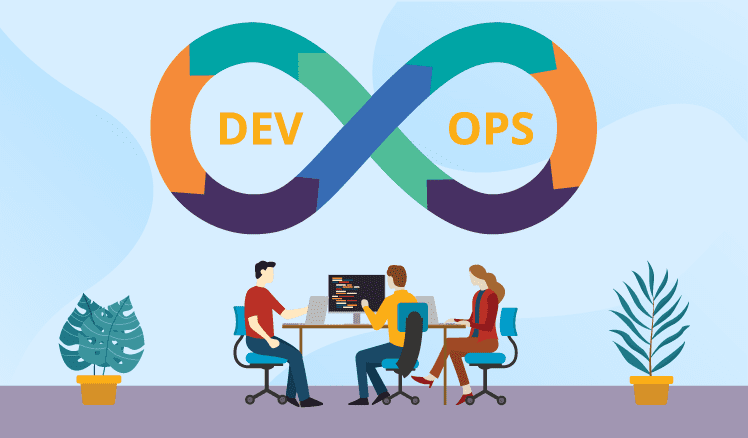DevOps (DEVelopment OPeration) is a set of practices created to improve the effectiveness of software development and operation process by enhanced collaboration. DevOps is an agile approach to software development. Its main goal is to eliminate organizational and time blocks and barriers between developers and other people who participate in the development process.
With a DevOps approach, the formerly divided operations like development, IT operations, security, and quality engineering work together in order to come up with better results. Teams that adopt the DevOps approach become more responsive to customer needs and achieve business goals faster.
The History of DevOps
DevOps first became popular during DevOps Days that took place in 2009 in Belgium. In 2010, the DevOps Day conference was held in California. Today, more than 30 such conferences are arranged every year across the U.S.A.
In 2013, Gene Kim, Kevin Behr, and George Spafford published a fiction book called “The Phoenix Project.” The story followed an IT manager who faced a hopeless situation when he needed to save a mission-critical e-commerce development project, which was in dire straits. Throughout the story, the main character came up with new ways of thinking about app development and implemented the DevOps concept.
Why DevOps Became Necessary
It can take a significant number of different specialists to develop a high-quality app. Unfortunately, many of them often have disagreements. Working together as a team can be complicated. Experts tend to pull the project in a different direction, slowing down the development process.
Meanwhile, in the high-speed environment brought about by the 21st century, companies need to get apps “yesterday.” Additionally, they need the ability to make changes along the way, demanding a 100% agile approach.
That’s why many developers felt that they have to choose between:
· Providing changes and apps quickly but creating an unstable development environment.
· Maintaining a stable environment but taking a long time to achieve results.
Both schemes were unacceptable, leading to high dissatisfaction and frustration rates from both the development team and the client.
Creators of Kubernetes DevOps platform remember that developers were always willing to work faster and faster. Meanwhile, the operation part of the team understood that such speed could backfire with an unstable system.
That’s when DevOps was created to bring everyone together:
· Development teams
· Deployment experts
· Business users
· Test engineers
· Security specialists
· System administrators
All of the above professionals were working together as a team. They understood each other’s strong sides and challenges and worked toward the same goal. As a result, the client received high-quality software within the set timeframe.
How did these experts manage to start working together even though they had real problems collaborating in the past?
They had to follow the same set of principles. While mostly standard, this set of principles was worked out for each team separately to achieve the best results.
Benefits of DevOps
By implementing DevOps in your organization, you can reap the following benefits:
· Speed – taking advantage of DevOps allows software development companies to develop and deploy products much quicker. This improves the company’s profitability and boosts its reputation.
· Improved collaboration – implementing DevOps took down a huge wall between development and operation specialists. This created a team of experts who trust each other and work toward the same goal instead of poking around blindly. This improved the overall work environment for all parties involved.
· Reliability – without DevOps, updating apps to suit the ever-changing user needs was complicated. There was always a chance that a new update could hinder the quality of the app. With DevOps’ continuous integration and delivery, it became easy to test software functionality with security and quality and mind, thus making effective changes.
One of the main benefits of using DevOps is scalability. Scaling a system without proper collaboration of development and operation teams used to be a tedious process. With DevOps, scalability is a reality for any product.
The Takeaway
DevOps is an innovative approach to software development, which has endured the test of time. It allowed development companies to improve inter-team collaboration and speed up the development process.
By implementing DevOps, developers can come up with higher quality products within a shorter period of time while maintaining a positive working environment.
My name is Sardar Ayaz a professional content writer and SEO expert having Proven record of excellent writing demonstrated in a professional portfolio Impeccable grasp of the English language, including idioms and current trends in slang and expressions. I have ability to work independently with little or no daily supervision with strong interpersonal skills and willingness to communicate with clients, colleagues, and management.
I can produce well-researched content for publication online and in print, organize writing schedules to complete drafts of content or finished projects within deadlines. I have 12 years’ experience to develop related content for multiple platforms, such as websites, email marketing, product descriptions, videos, and blogs.
I use search engine optimization (SEO) strategies in writing to maximize the online visibility of a website in search results
